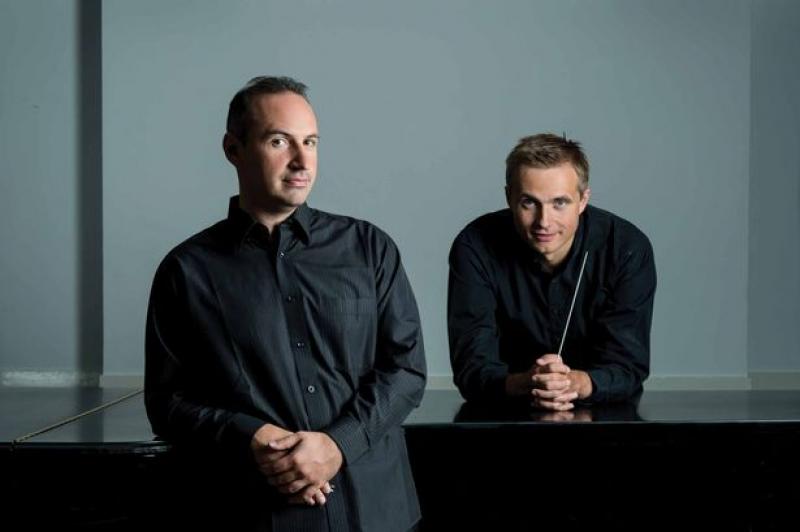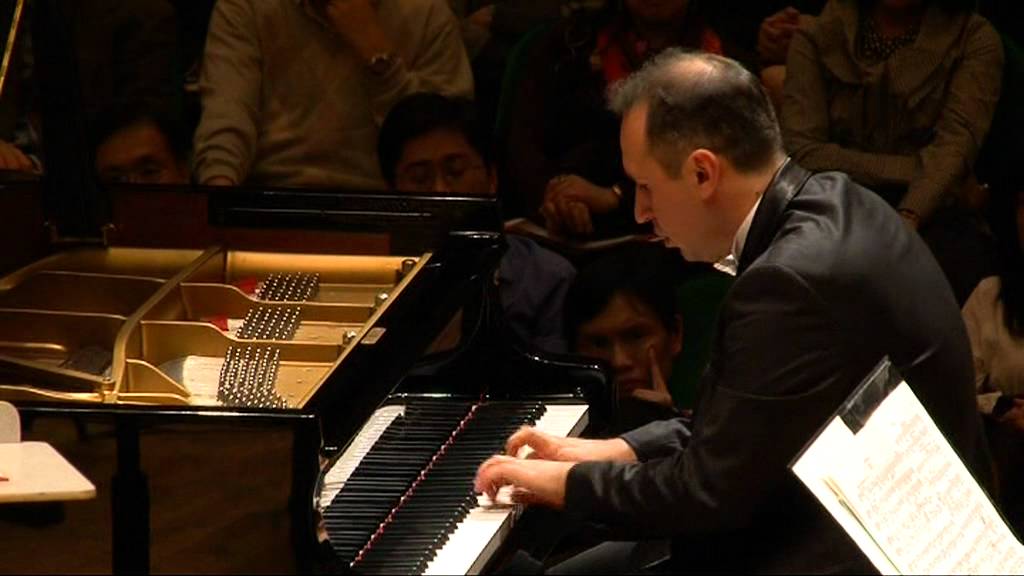Trpčeski, RLPO, Petrenko, Liverpool Philharmonic Hall review - one composer, many views | reviews, news & interviews
Trpčeski, RLPO, Petrenko, Liverpool Philharmonic Hall review - one composer, many views
Trpčeski, RLPO, Petrenko, Liverpool Philharmonic Hall review - one composer, many views
Brahmsfest brings a big spectacular from a dream team

It probably goes without saying that there will be "dream teams" in a football-mad city like Liverpool. What might be a little unusual is that this particular one has long been associated with the Liverpool Philharmonic and has turned into one of the most potent marketing forces for the organisation for many a long year. It has nothing to do with the "beautiful game", though.
Indeed, as Trpčeski pointed out when introducing his post-concerto encore, a snippet from Brahms's Schumann Variations, it’s been 15 years since his first concert appearance on Hope Street. One wonders whither this partnership once Petrenko departs for pastures new.
Their latest concert was the last of the series examining Brahms. These have included all the symphonies, the German Requiem and just the First Piano Concerto. “Just” might not be kind. It is not an easy work, neither for performers nor listeners. But this was a mature, robust performance. The Royal Liverpool Philharmonic Orchestra seemed to be on edge, accepting that the "dream team" was in town and that this was not the time to score an own goal.
This performance of the concerto showed that clear and defined empathy between the soloist and the conductor. The first movement was robust to the point of pomposity, almost emphasising points of argument between orchestra and soloist. But throughout, there was drama. Tension was apparent with the orchestra apparently on edge. It’s not a piece which has humour as a trait but, just occasionally, Petrenko let those light beams show through the over-riding gloom of the first movement. And when he let those beams shine forth, it was a breath of fresh air.  But that drama... There was that sudden piano outburst at the start of the development section. It was quite sublime, if not totally arresting. Then there was the stunning diminuendo leading into the explosive conclusion to the whole movement. The glorious Adagio was reserved, almost eerie at times although the inherent drama expected of this performance rarely failed. And then there was the stupendous Rondo. Its arrival was precipitous, if not surprising. Here there was humour, bravado almost. It was also possible to see Trpčeski (pictured above playing in Honk Kong) enjoying himself, bouncing on the piano stool and laughing as he played. Rarely can an audience have seen more joyous music making.
But that drama... There was that sudden piano outburst at the start of the development section. It was quite sublime, if not totally arresting. Then there was the stunning diminuendo leading into the explosive conclusion to the whole movement. The glorious Adagio was reserved, almost eerie at times although the inherent drama expected of this performance rarely failed. And then there was the stupendous Rondo. Its arrival was precipitous, if not surprising. Here there was humour, bravado almost. It was also possible to see Trpčeski (pictured above playing in Honk Kong) enjoying himself, bouncing on the piano stool and laughing as he played. Rarely can an audience have seen more joyous music making.
The Fourth Symphony was an altogether more black-and-white event. It presented bright and dark, the sombre pitted against the humorous, witty side of Brahms. The huge questions presented by the first movement were airily asked by both conductor and orchestra. It was a shapely performance which brought a lot to bear on the audience (a six-minute highly informative explanation of the work by Petrenko, in addition to the programme notes, helped).
There followed a solid Andante which melted into a seriously raucous and, perhaps, rather too energetic third movement followed by a sublime and hugely conclusive finale. Add to that some brilliant brass playing, the horns especially, as well as some splendid string moments, and this was a Brahms exploration well worth following. There should be more similar composer-oriented seasons.
The future of Arts Journalism
You can stop theartsdesk.com closing!
We urgently need financing to survive. Our fundraising drive has thus far raised £49,000 but we need to reach £100,000 or we will be forced to close. Please contribute here: https://gofund.me/c3f6033d
And if you can forward this information to anyone who might assist, we’d be grateful.

Subscribe to theartsdesk.com
Thank you for continuing to read our work on theartsdesk.com. For unlimited access to every article in its entirety, including our archive of more than 15,000 pieces, we're asking for £5 per month or £40 per year. We feel it's a very good deal, and hope you do too.
To take a subscription now simply click here.
And if you're looking for that extra gift for a friend or family member, why not treat them to a theartsdesk.com gift subscription?
more Classical music
 Kempf, Brno Philharmonic, Davies, Bridgewater Hall, Manchester review - European tradition meets American jazz
Bouncing Czechs enjoy their Gershwin and Brubeck alongside Janáček and Dvořák
Kempf, Brno Philharmonic, Davies, Bridgewater Hall, Manchester review - European tradition meets American jazz
Bouncing Czechs enjoy their Gershwin and Brubeck alongside Janáček and Dvořák
 Solomon, OAE, Butt, QEH review - daft Biblical whitewashing with great choruses
Even a top soprano and mezzo can’t make this Handel paean wholly convincing
Solomon, OAE, Butt, QEH review - daft Biblical whitewashing with great choruses
Even a top soprano and mezzo can’t make this Handel paean wholly convincing
 Two-Piano Gala, Kings Place review - shining constellations
London Piano Festival curators and illustrious friends entertain and enlighten
Two-Piano Gala, Kings Place review - shining constellations
London Piano Festival curators and illustrious friends entertain and enlighten
 Echo Vocal Ensemble, Latto, Union Chapel review - eclectic choral programme garlanded with dance
Beautiful singing at the heart of an imaginative and stylistically varied concert
Echo Vocal Ensemble, Latto, Union Chapel review - eclectic choral programme garlanded with dance
Beautiful singing at the heart of an imaginative and stylistically varied concert
 Scott, Irish Baroque Orchestra, Whelan, RIAM, Dublin review - towards a Mozart masterpiece
Characteristic joy and enlightenment from this team, but a valveless horn brings problems
Scott, Irish Baroque Orchestra, Whelan, RIAM, Dublin review - towards a Mozart masterpiece
Characteristic joy and enlightenment from this team, but a valveless horn brings problems
 Classical CDs: Voice flutes, flugelhorns and froth
Baroque sonatas, English orchestral music and an emotionally-charged vocal recital
Classical CDs: Voice flutes, flugelhorns and froth
Baroque sonatas, English orchestral music and an emotionally-charged vocal recital
 Kanneh-Mason, Britten Sinfonia, Shave, Milton Court - a grin and a big beaming smile
A pair of striking contemporary pieces alongside two old favourites
Kanneh-Mason, Britten Sinfonia, Shave, Milton Court - a grin and a big beaming smile
A pair of striking contemporary pieces alongside two old favourites
 theartsdesk at the New Ross Piano Festival - Finghin Collins’ musical rainbow
From revelatory Bach played with astounding maturity by a 22 year old to four-hand jazz
theartsdesk at the New Ross Piano Festival - Finghin Collins’ musical rainbow
From revelatory Bach played with astounding maturity by a 22 year old to four-hand jazz
 First Person: Manchester Camerata's Head of Artistic Planning Clara Marshall Cawley on questioning the status quo
Five days of free events with all sorts of audiences around Manchester starts tomorrow
First Person: Manchester Camerata's Head of Artistic Planning Clara Marshall Cawley on questioning the status quo
Five days of free events with all sorts of audiences around Manchester starts tomorrow
 Goldscheider, Brother Tree Sound, Kings Place review - music of hope from a young composer
Unusual combination of horn, strings and electronics makes for some intriguing listening
Goldscheider, Brother Tree Sound, Kings Place review - music of hope from a young composer
Unusual combination of horn, strings and electronics makes for some intriguing listening

Add comment